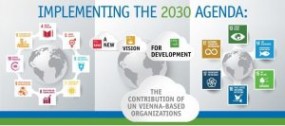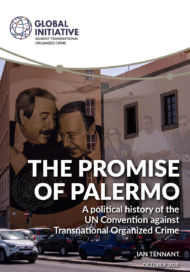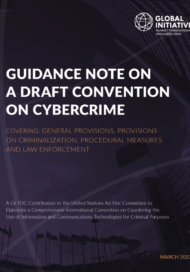Posted on 15 Dec 2017
UN Secretary General António Guterres has described the complex system he now leads as a ‘fragmented structure’ marked by ‘Byzantine processes’, which do not to help achieve the organization’s goals. Reform of the UN System therefore occupies a central position at high-level discussions and is a central concern of the new Secretary General. To fulfil the inclusive vision outlined in the Sustainable Development Goals, we must pave the way for greater cohesion and collaboration among the disparate UN agencies. The challenges and opportunities are how the many arms of the UN, reflected in their different mandates, expertise and resources, can work together more effectively. This requires commitment by all member states and all stakeholders.
Firstly, where mandates between different bodies overlap, there needs to be information sharing and awareness of the issues that fall between agencies’ traditional remits. The mandates of individual agencies are not discrete: the global issues they seek to address are multilayered and cross-cutting, and require coordinated responses across different policy areas.
Take, for example, the UN System’s approach to HIV prevention, treatment and care in prisons – an issue that occurs at the nexus of public health, criminal justice and narcotic drugs policy.
Globally, prisons are characterized by relatively high prevalence of HIV and other communicable diseases, along with diminished access to health services. In some settings, the rate of HIV among prison populations can be up to 50 times greater than that of wider society. This heightened prevalence may be through shared use of needles for injecting drugs, unsafe sexual practices and unsterilized medical equipment. For women and children, the risk of mother-to-child transmission is an added burden. In many prisons, there are no services that provide for their needs.
Prevention of mother-to-child transmission (PMTCT) of HIV is of paramount importance for women and newborn children in prisons. Limited access to HIV prevention, to pre- and post-natal care services and to antiretroviral therapies, combined with a high HIV prevalence in prisons, means that newborn children in prisons are at significantly higher risk of becoming infected with HIV.
The UN Office on Drugs and Crime (UNODC) has aimed to place this issue higher on the international agenda. This year’s 26th Session of the Commission on Crime Prevention and Criminal Justice (CCPCJ) saw the passing of a landmark resolution that – for the first time – encourages member states to ensure access to measures for PMTCT of HIV in prisons.
These achievements provide an example of collaboration among different bodies on issues that cut across the traditional mandates of different agencies. For example, the work of the UNODC (through the Commission on Narcotic Drugs) and the CCPCJ as an agency primarily concerned with criminal justice facilitates the work of public-health agencies such as the World Health Organization and UNAIDS. Partnership, collaboration and interaction among these entities have proven essential for generating a cohesive response to meeting the needs of some of the most vulnerable people, not least newborns and infants.
As the UN responds to emerging and evolving challenges, and accordingly assigns mandates, and establishes new bodies and working groups, it must ensure that it continues to draw from expertise across the entire system, while taking into account the numerous conventions underpinning this work.
The UN Office of Counter-Terrorism was established on 15 June 2017 – under the leadership of Under-Secretary-General Vladimir Ivanovich Voronkov – to coordinate the overall UN response to terrorist threats, incorporating the UN Counter-Terrorism Centre and the Counter-Terrorism Implementation Task Force. Its primary aims are to give leadership and coherence to the multilayered, complex counter-terrorism structure at the UN, improve efficiency of existing counter-terrorism measures and promote these as a core focus across the UN bodies. The new office aims to overcome the previous fragmentation of UN counter-terrorism efforts – which had been criticized by member states and observers – and thereby to create an approach that is more strategically cohesive. A reinvigorated and all-UN approach to counter-terrorism is highly welcome and should serve to build on essential expertise held in different bodies and working groups.
The UNODC Terrorism Prevention Branch has, for over a decade, been of primary importance among UN entities in providing technical counter-terrorism assistance to member states. Its work includes supporting the creation of national legislation, facilitating international cooperation in criminal matters and building the capacity of criminal-justice officials. Its mandate has been enhanced over the years, strengthening the key role of the branch in suppressing terrorism worldwide. As part of the UNODC, the Terrorism Prevention Branch has a number of comparative advantages to offer an effective counter-terrorism strategy. It may draw on a range of expertise in crime prevention and criminal justice, rule of law, drug control, transnational organized crime, money laundering and corruption – all areas that are often intertwined with instances of terrorism around the world. The UNODC may also readily draw on its presence in the field and on regional expertise to build counter-terrorism strategies specifically tailored to each situation. The UN Convention against Transnational Organized Crime underpins much of this important work.
These examples aim to illustrate the competing demands that face the UN System Guterres seeks to reform, the cross-cutting and comprehensive nature of the Sustainable Development Goals, and the need for cooperation across the UN System to promote their effective implementation. Reshaping a complex international organization is no simple task: all parties must commit to and take ownership of the process. This necessitates an inclusive and transparent process, and one where outreach from New York to the other UN capitals will be essential.



